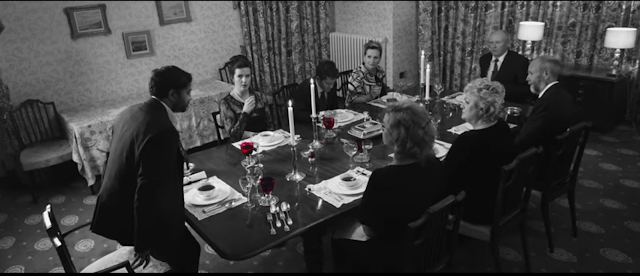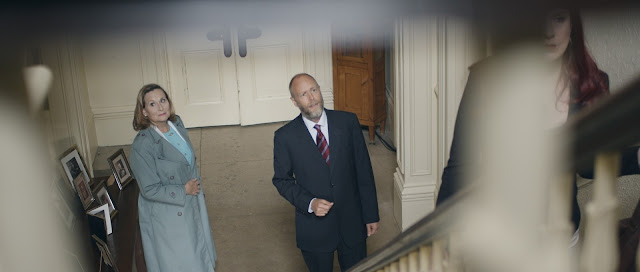 |
| Britten: Owen Wingrave - Ross Ramgobin, Kitty Whately, James Way, Janis Kelly, Madeleine Pierard, Susan Bullock, Richard Berkeley Steele, William Dazeley - Grange Park Opera (video screen grab) |
Britten Owen Wingrave; Ross Ramgobin, Richard Berkeley Steele, William Dazeley, Janis Kelly, James Way, Susan Bullock, Madeleine Pierard, Kitty Whately, dir:Stephen Medcalf, cond; James Henshaw; Grange Park Opera
Reviewed by Robert Hugill on 9 December 2020 Star rating: (★★★★)
Grange Park Opera returns Britten's penultimate opera to the television medium for which it was written, in a striking, blackly comic modern version.
Benjamin Britten's penultimate opera, Owen Wingrave is a strange and tricksy piece. Written for television in 1971, Britten intended it both for that medium and the stage. But following a small flurry of performances in the early 1970s, the work lay fallow until Glyndebourne's performance in the late 1990s (first on tour, with William Dazeley as Owen, and then on the main stage where the title role was taken by Gerald Finley). This production demonstrated that Britten's 'lame duck' opera could work, and productions multiplied in the 21st century, partly thanks to a reduced orchestration from David Matthews. Recent London productions have included two [British Youth Opera, see my review, and Guildhall School of Music and Drama, see my review] where the young men in the opera were played by singers of the correct age which is a nice idea, but Britten's quite substantial orchestration can require a mature baritone to carry the role.
The opera, however, remains awkward. The characters are generally unlikeable, whilst Owen can too often seem a prig. And then there is the ghost story aspect; Britten simply shies away from that. We never see what happens in the room, and the power of the ghosts in The Turn of the Screw is entirely absent (both operas are based on stories by Henry James). Dramaturgically, I have always felt that the opera would work better if librettist Myfanwy Piper had replaced the ghost episode with a more down to earth dare-devil stunt.
There have been television production since that 1971 production, there was one in Germany in 2005 again with Gerald Finley [available from Amazon]. But it remains a brave decision for Grange Park Opera, faced with no live opera in 2020, to create a new televised version of Britten's Owen Wingrave. Stephen Medcalf directs [see my 2018 interview with Stephen Medcalf], with Ross Ramgobin as Owen, Susan Bullock as Miss Wingrave, Richard Berkeley Steele as Sir Philip Wingrave, William Dazeley as Mr Coyle, Janis Kelly as Mrs Coyle, James Way as Letchmere, Madeleine Pierard as Mrs Julian, and Kitty Whately as Kate with Richard Berkeley Steele singing the ballad singer/narrator. The conductor was James Henshaw, with accompaniment from Chris Hopkins (piano) and Craig Apps (percussion), plus trumpet for Act Two.

Britten: Owen Wingrave - Ross Ramgobin - Grange Park Opera
Medcalf sets the work in the near present day (press coverage in advance of the premiere of the film refers to it as being set just after the Afghanistan war in 2001). It is largely shot in black and white (there were touches of colour such as the blood-red wine glasses in the terrible dinner scene which concludes Act One). He makes it very much a film, there is a lot of intercutting of close-ups. The women's ensemble which precedes Owen's entry into the house is done with each at her own window, creating a real sense of three intertwining monologues. Other ensembles are similar, and Medcalf successfully banishes any real sense of the stage.
He also mines a bleak vein of near comedy. When we first see her, Owen's aunt, Miss Wingrave (Susan Bullock) is furiously playing on a violent computer war game. The scene in the Coyles' bedroom at the end of Act Two features soprano JanisKelly (Mrs Coyle) singing in her bath.
Medcalf's solution to another of the opera's problems is interesting. The story and the opera make a big deal of the house, Paramore, with its hall full of pictures of Owen's ancestors, in a way which makes the house almost a character. But Britten never quite banishes thoughts of Gilbert and Sullivan's Ruddigore, and the idea that when Owen is gone the images in the picture will break out into a chorus of 'The ghosts high noon'! Here, Paramore is a suburban Victorian villa. Large, yes, grand no. The hall is a multilevel functional hallway (which allows for some stunning multi-level scenes), the images of the ancestors are simply a table full of photographs. But given a larger budget and fewer restrictions, a designer would surely have dressed the interior in something other than a rather too modern bright, neutral white. The result is to make the house less of a character and more of an embodiment of an idea, inculcated by Owen's family.
But it has another effect too, a number of the scenes call for groups of the characters to be assembled in the hall, the new setting gives the whole thing a blackly comic soap-opera feel, which culminates in the scene where Owen goes in to his grandfather's study. We only eavesdrop on this, hearing just Sir Philip's voice through the door. And in this version, the other characters eavesdrop too, huddled in the hallway for all the world like the cast from a forgotten 1990s soap opera.

Britten: Owen Wingrave - Janis Kelly, William Dazeley, Kitty Whately - Grange Park Opera
The result does not lighten the opera, but simply shifts the focus. Each of the singers delivers a wonderfully strongly etched character. Susan Bullock's Miss Wingrave would be comic if the effects of her viciousness were not so serious. Kitty Whately's Kate is wonderfully lacking in self-awareness, simply parroting what everyone else feels, whilst as her mother, Madeleine Pierard is the picture of anxious self-interest, the typical poor relation. James Way's Letchmere was ardent and naive, engaging and thoughtless. The two most human characters are the Coyles, William Dazely and Janis Kelly, and brought out both the humanity in their characters but also the polite ineffectuality which allows the disaster to happen. Richard Berkeley Steele sings the narrator/ballad singer's role, as Pears did in the original, but here it is done not as a distancing device but as an interior monologue for Sir Philip. The result is to humanise him somewhat, and make you realise that he is not quite as black and white as you thought.
So we focus on Owen; a strong performance from Ross Ramgobin who eschews naivety and priggishness and replaces them with an ardent stubbornness. Ramgobin makes a complex and very watchable Owen, dogged rather than callow. The ending was somewhat surprising, we never do see the room and Owen's body lies outside as if he has thrown himself out of a window. Medcalf's solution to the ghosts/no ghosts dilemma perhaps?
The film is a striking achievement. It was filmed during five days in September with minimal crew and other restrictions. But in the music and drama there is little sense of restriction, and Medcalf has used the very restrictions to create a striking and rather closely intense film. Throughout there is a feeling of claustrophobia, and the sound-track is similarly close with no artificial reverberance. The only sense of restriction comes from the accompaniment. Though finely played by Chris Hopkins and Craig Apps, the reduction for piano and percussion feels somewhat provisional, and we miss the wonderful colours of Britten's full orchestration.

Britten: Owen Wingrave - Susan Bullock, William Dazeley - Grange Park Opera
Owen Wingrave is available from the Grange Park Opera website.
- Immersive and intense: Schubert's Swan Song from Roderick Williams and friends at Spotlight Chamber Concerts - concert review
- In the depths of deep despair: James Cleverton and Nigel Foster premiere Iain Bell's song cycle based on Thom Gunn's collection The Man with Night Sweats - concert review
- Making music in complex times: conductor
Cornelius Meister on his recent concerts in Scotland, his work with the
opera in Stuttgart and national differences in performing styles - interview
- Rediscovering Handel's keyboard music for a new generation: Pierre Hantaï's disc of the 1720 Suites de Pièces - CD review
- Christmas CD roundup: carols ancient, modern and medieval, Christmas in Puebla, a Georgian trilogy and much more - CD review
- A record dedicated to those who believe in ‘the holiness of the heart’s affections and the truth of imagination.’ - Bryce Morrison on Nelly Akopian-Tamarina's Slavonic Reflections - CD review
- In Motion: United Strings of Europe's debut disc features three contemporary works alongside two classics in a strongly coloured programme - CD review
- Revolving Rondo: Nils Klöfver's engaging recital explores the work of virtuoso guitarist composers from the 16th century to the present day - Cd review
- From
Handel's contemporaries to a forgotten Malcolm Arnold opera: I chat to
conductor John Andrews about reviving neglected music - interview
- Ohrwurm: recorder player Tabea Debus delightful debut recital on Delphian - CD review
- A theatrical family & a damaged dancer: Christoph Loy's new production of Rusalka at the Teatro Real, Madrid - opera review
- Home











No comments:
Post a Comment